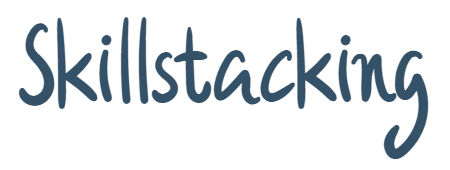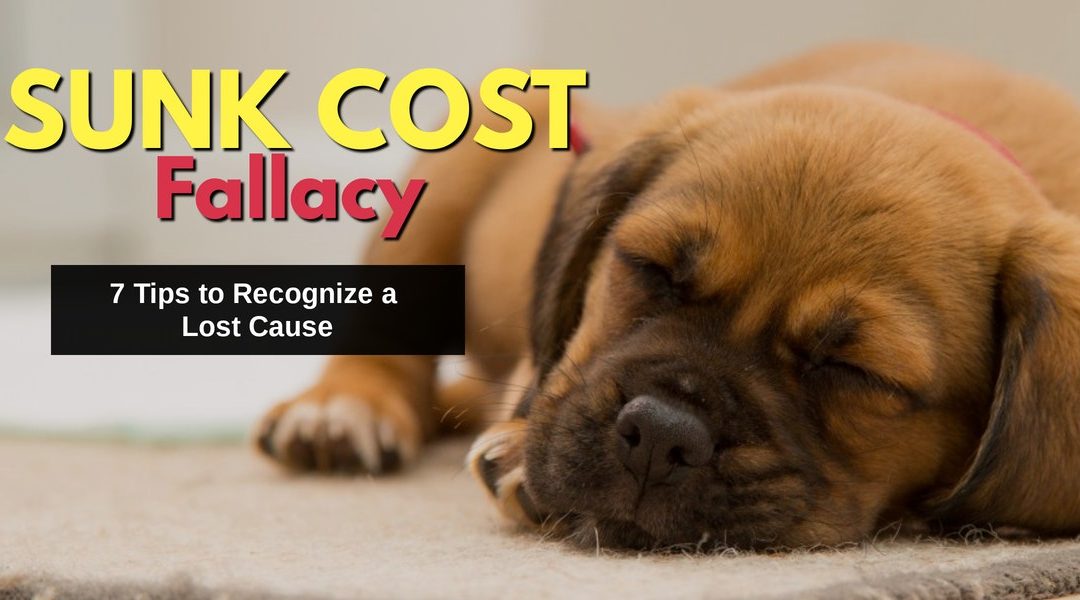Many people do not let go of an endeavour after having put in time, money and effort. This is called “The Sunk Cost Fallacy”, and if we are not conscious of it, we can actually make things worse. We humans have strong feelings of loss aversion, and often pay a high cost just to feel like we did not lose anything.
Examples
- “I paid for it, therefore I will eat it all”. The meal you ordered was bigger than you would ever eat at home and you have an instinct to finish it all because you would be “wasting food”. You know the truth, that the extra French Fries are better in the garbage than in your stomach.
- “I do not want to lose my deposit”. You agreed to buy a house, and let the inspection date pass, but you found out there is a $50,000 liability and you can lose your $10,000 deposit if you pull out. Ouch. Take the hit and move on. I makes sense to $10,000 to avoid losing $50,000, right?
- “I have pocket Jacks, but the flop shows King, Queen, Ace”. In poker, I have seen people continue to bet even after they are very certain they have lost. When the hand is over, they invariably lose, and they flip their cards saying “I had to go!”. When new information reveals itself, allow yourself to realize the loss.
- “This Movie/TV Series/Book is terrible, but I have to finish it”. No you don’t. It’s not likely going to get better. Leave it and revel in your bravery.
- “I’m going to stay in this relationship even though it is not longer working”. You stay with a boyfriend/girlfriend/business partner longer than you have to in order to avoid pain, or admit loss. Having invested so much in the partnership, you can fool yourself into sticking with plan in order to avoid facing loss. Ask yourself if you have done everything you can for success, and then make a decision.
- “I already spent two years on this project, I have to keep going. I’m not quitter”. It is hard to admit that the 2 years have been a failure. But think of what else you could be doing, or think of the future. How bad would it be if you put two more years into the same project!
How to Deal with the Sunk Cost Fallacy
- Depersonalize. Pretend the situation was thrust upon you by some stranger then ask yourself what would you do?
- Willful Ignorance. Try to ignore all of the previous costs associated.
- Examine New Information. New information or lessons learned can change your view.
- Ignore Shame. There is no shame in not finishing something that will not pay dividends.
- Examine Opportunity Costs. Think about what else you could be doing with your time/money/energy.
- Ignore Bravado. Your ego can fool you into thinking that you must complete everything you start.
- Request Feedback. Get a respected source to come and examine the situation impartially (and try not to get offended).
Bonus: Perseverance versus Sunk Cost Fallacy
This one is hard to reconcile. Napoleon Hill in his book “Think and Grow Rich” tells the story of the gold miner that stopped digging 3 feet from gold, only to have another miner strike it rich by picking up where he left off. This story sings the praises of perseverance (never give up), preaching that with enough time/money/effort, you are bound to succeed.
Maybe my issue is more with the particular example. The miner could have dug for years, and given up his most precious resource: his time. I am sure that Napoleon Hill would not encourage people to persevere to win the lottery by buying tickets all the time, the motivation being that you are just 1 ticket from gold.
My opinion is that there is nuance to the situation. Perseverance is commendable when used in conjunction with a good probability of success. Furthermore, it is important to learn during the process, and stop to take the time to examine whether the activity is worth pursuing, or modifying in some way.
Beware the unexamined perseverance!
Please feel free to comment below, send me some direct feedback, or share on the Socials. I am grateful to have you on this journey with me!







Good morning Mark,
When investing you often hear that you never sell when you’re down and that you haven’t really “lost” any money if you don’t sell for a loss, causing people to hold on to something that may have lost 50% of it’s value.
Where do stand on this?
Great question. I personally think that when the words “never” and “always” are used limits thoughtful analysis. If I had a property in a single industry town (flint michigan) and the business leaves, would I blindly follow this rule down to 0?
Here are the strategies and the tactics that I use.
Strategically I ask myself “Would I buy this property at this price?” In determining the answer I try to forget the past and objectively analyze the investment and its future outlook. If the answer is yes, then I hold the property. (I won’t go into the whole analysis process but the point is to analyze it objectively). If the answer is no, then I think about the best tactical way to exit the investment.
Tactically, I look at a bunch of factors like
– should I trigger some capital gains to offset the losses? Is this a good year to do it?
– what are the costs of exitting now? Mortgage, agents, etc?
– is it the best time of the year to sell?
Poket is won by strategically folding when you are beat, and I think this applies to real estate when the conditions have changed.
It just hurts…
Realizing an investment is a loss isn’t easy. And it takes courage to cut a deal loose or sell at a loss, especially when a lot of effort and resource have been pulled in.
It sucks, no doubt. And can be emotionally draining.
The bright side is this act alone opens new opportunities, frees up the funds and future time for better outcomes. It definitely makes a person wiser.
Not always easy to recorgnize it’s a loss though. Especially when building a business and things not going as planned for long time. It takes much deeper thinking to form a judgement. Assessing a deal is easier.
Excellent point. When I’ve (finally!) walked away from a lost cause, I feel an immediate sense of relief. A weight is lifted. Sometimes I go through some mourning, and I try to limit that time.
Opportunity costs disappear and I can focus on other things. I agree with you; that truly is the best outcome of realizing a loss.